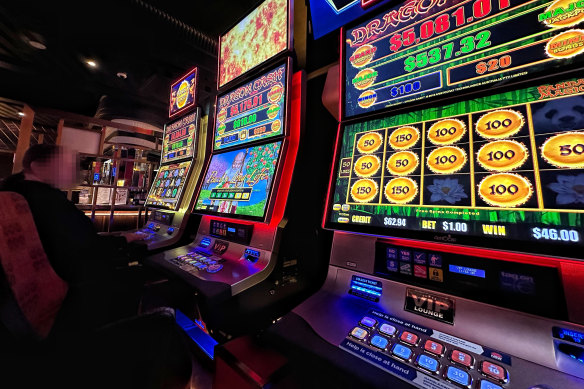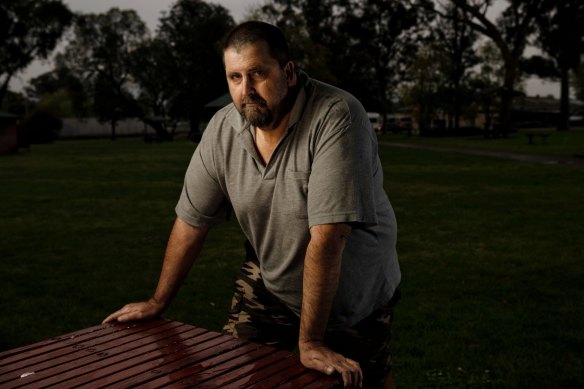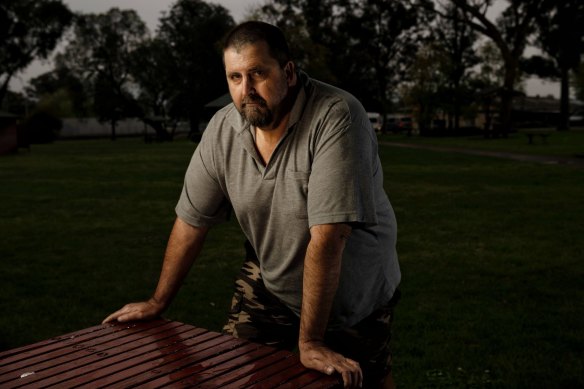A gambling research forum that influences the policy agenda in NSW is dominated by gambling industry figures and its annual conference is sponsored by gambling organisations.
The National Association of Gambling Studies (NAGS) has adopted a position of studied neutrality, declaring on its website that it has “no opinions or biases in the gambling debate”. But its board includes a ClubsNSW employee, a TabCorp employee and academics whose work has been criticised for being funded by organisations that profit from poker machines. Several of its annual conferences have been held in casinos.

The National Association of Gambling Studies has previously drawn criticism for holding annual conferences in a casino.Credit:Nick Moir
On Tuesday, ClubsNSW whistleblower Troy Stolz was amazed to be contacted by the immediate past president of the NAGS and told his name had been raised as a potential panellist and closing speaker at the research organisation’s annual conference in November.
Stolz, who has terminal cancer, is on a mission to raise public awareness about the lax approach taken by clubs and pubs towards gambling harm minimisation and money laundering through poker machines. ClubsNSW, a long-time sponsor of the conference, is pursuing him through the courts to prevent him from disclosing information he obtained as that organisation’s head of anti-money laundering compliance.
But a day after Stolz texted NAGS president Paul Delfabbro on the number provided to him, Delfabbro texted him to say the program was full. “No obvious gaps where we could squeeze something in,” he wrote, adding that Stolz’s area of expertise would be more of a focus next year. Stolz’s prognosis does not extend to the 2023 conference.
Alex Blaszczynski, a founding board member and University of Sydney academic, said he had informally raised Stolz’s name, but concerns had been raised by the NSW board delegate, Judi Single, who is also the responsible gambling services manager for ClubsNSW.

ClubsNSW whistleblower Troy Stolz leaked documents that exposed lax compliance with anti-money laundering laws.Credit:Nick Moir
“There were concerns that if Troy wanted to discuss things at a global level without making any vindictive remarks about ClubsNSW then he’s entitled to express his opinions, but not if he starts to make statements which are unprofessional or vindictive,” Blaszczynski said.
If his name had been taken to the committee, Single would have had to recuse herself on the grounds that she had a conflict of interest, he said.
ClubsNSW said in a written statement that it had no involvement in determining the content for the NAGS conference. “It would appear that the program for this year has been finalised and has been publicly available online since 19 September 2022.”
The NAGS conference has lost credibility among public health researchers due to its ties with the gambling industry. But it continues to engage with government. Two of the panellists at the conference to be held at Sydney’s Hilton Hotel in November are employed by the NSW Office of Responsible Gambling.
In 2014, keynote speaker Mike Daube, a public health researcher at Deakin University, expressed discomfort that the event was being held at Jupiter’s Casino on the Gold Coast. He then questioned the independence of research that was funded by gambling interests.
“If you win and accept funding from one of the reputable research funding bodies you are beholden to nobody,” he said. “By contrast, seeking and accepting gambling – or tobacco or alcohol – funding essentially makes you part of their public relations and lobbying strategy to prevent serious action at the population level.”
Blaszczynski, who has published research funded by ClubsNSW, said nobody had ever found inaccuracies in his work or argued with his findings. The NAGS conference offered an exchange of ideas and it was counter-productive for public health academics to boycott it, he said. “You end up in a situation where the converted are preaching to the converted and you have no divergent view.”
But Monash University public health professor Charles Livingstone said the conference influenced the policy agenda in government because it normalised “responsible gambling”, an industry term used to push responsibility onto individuals for succumbing to an addictive product.
“If you look at the gambling policy in Australia you will see that responsible gambling has long been the paradigm,” Livingstone said. “And NAGS is a very good place to legitimise responsible gambling as the dominant paradigm.”
ClubsNSW drew on the concept of personal responsibility in its opposition to a “digital wallet” that was pitched by Customer Service Minister Victor Dominello before gaming was stripped from his portfolio last year. The proposal included a cashless card to target money laundering and minimise gambling harms. ClubsNSW fiercely opposed a proposal for the card to be mandatory.
A trial for a cashless gaming card set to begin on Saturday will link patrons’ mobile phones to 36 gaming machines at Wests Newcastle that have been installed with the technology. Patrons will be able to transfer money directly from the gaming wallet on their phone onto the machine through Bluetooth, and set playing time and expenditure limits.
The scheme will be voluntary.
The Morning Edition newsletter is our guide to the day’s most important and interesting stories, analysis and insights. Sign up here.
